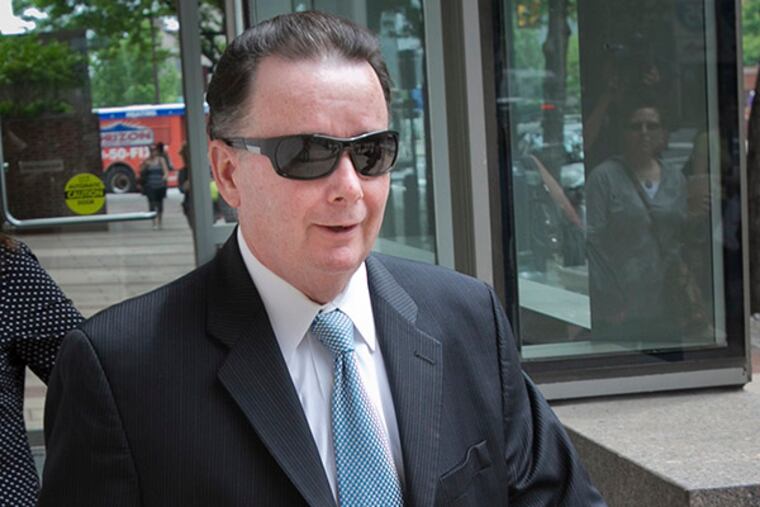Former Traffic Court judge gets 20-month prison sentence
As he faced sentencing on a perjury charge Wednesday, former Philadelphia Traffic Court Judge Michael Lowry sought to convince a federal court of one of his most firmly held beliefs: He was different.

As he faced sentencing on a perjury charge Wednesday, former Philadelphia Traffic Court Judge Michael Lowry sought to convince a federal court of one of his most firmly held beliefs: He was different.
His lies before a grand jury were not as bad as those that sent two of his colleagues to prison, his lawyers argued. His participation in Traffic Court's culture of ticket-fixing for the politically connected was somehow less severe, they said.
But U.S. District Judge Lawrence F. Stengel left little doubt Wednesday as to how convincing he found those distinctions. He sentenced the 60-year-old ex-jurist to 20 months behind bars - one of the stiffest punishments imposed in the case.
"Mr. Lowry was an elected judge who was deeply involved in a corrupt system at Traffic Court," Stengel said. His conduct showed "not a respect for the law, but a respect for influence."
For his own part Wednesday, Lowry said he regretted allowing friends, family members, and political allies to ask for special consideration in his courtroom.
"I had the opportunity to say no, and I didn't do it," he said. "I didn't have the courage to do it."
But even in that apology, federal prosecutors found fault.
"It's a lot of passive voice," Assistant U.S. Attorney Denise Wolf said. "Mr. Lowry stood up and said he regrets allowing other people to ask for consideration. It's still questionable in my mind whether he accepts his own responsibility for what he has done."
Lowry was convicted in July along with three of his Traffic Court colleagues of lying to federal authorities about the dozens of traffic citations they dismissed based on requests quietly passed between judicial chambers.
He lost his job, after three years on the bench, when the scandal prompted state lawmakers to dismantle the court in 2013 and replace it with a traffic division in Municipal Court.
And though a federal jury acquitted the judges of more serious conspiracy and fraud charges, Stengel expressed little patience Wednesday for parsing any distinctions implied by that split verdict. He swatted aside pleas for leniency put forth by Lowry's lawyers, William A. DeStefano and Terri Pawelski.
"We can't have all sat in this room all summer and have any doubt that these defendants were fixing tickets," he said.
DeStefano argued that Lowry should receive credit for being more truthful than his fellow judges. The ex-judge admitted the court's systemic corruption in his 2013 appearance before the grand jury, even though he also said he treated everyone in his courtroom the same.
Stengel replied, "I'm not going to grade or compare levels of perjury."
As for Lowry's claim that the handful of tickets he fixed were far outweighed by the hundreds he adjudicated appropriately each week, Stengel scoffed.
"So if you walk past a bank 20,000 times in your life and one time you walk in to rob it, does it make it any less of a bank robbery?" he said.
The sentence Lowry received Wednesday exceeds that handed down to Judge Robert Mulgrew, who was given 18 months behind bars at a hearing in December.
Kenneth Miller, a suburban magistrate who filled in at Traffic Court and pleaded guilty to his participation in the corruption scheme, was given a sentence of probation last week.
Only Thomasine Tynes, who was also accused of witness tampering and pleaded guilty on separate corruption charges in state court last month, has received a stiffer punishment - two years behind bars.
But harsher sentences may be coming for the two remaining judges in the case. Willie Singletary was also accused of promising campaign donors his "hook up" from the bench and later baring his genitals in photos sent to court staff; Fortunato Perri Sr. admitted trading his judicial influence for bribes of seafood and porn.
Still, DeStefano said, the sentence Lowry received Wednesday seemed "a little harsh."
Stengel defended it by quoting from an judicial opinion in another ticket-fixing case: Improper favors doled out by a single judge breed public cynicism against the judiciary as a whole.
Turns out that those lines, quoted from a 15-year-old opinion, seemed to say that Lowry's story was not so different after all.